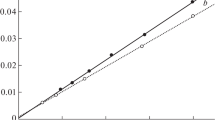Summary
The optimal peak separation is defined as one from which the maximal amount of Shannon information called FUMI can be collected. The optimal peak separation depends on the peak-resolving powers of the data processing used for a chromatographic system. Data processings of different peak-resolving powers have their own optimal peak separation of different Rs. This paper demonstrates that a data processing of superior powers can collect more information from the optimal than an inferior one, although the information FUMI is calculated from their own optimals. The flow chart for the calculation of FUMI is annexed.
Similar content being viewed by others
References
Hayashi Y, Yoshioka S, Takeda Y (1989) Anal Sci 5:329–334
Hayashi Y, Matsuda R (1989) Anal Chim Acta 222:313–322
Hayashi Y (1990) Anal Sci 6:15–19
Massart DL, Vandeginste BGM, Deming SN, Michotte Y, Kaufman L (1988) Chemometrics: a textbook. Elsevier, Amsterdam
Matsuda R, Hayashi Y, Ishibashi M, Takeda Y (1989) Anal Chim Acta 222:301–312
Hayashi Y, Matsuda R (1989) Anal Sci 5:459–464
Hayashi Y, Matsuda R (1990) Anal Sci 6:131–133
Matsuda R, Hayashi Y, Ishibashi M, Takeda Y (1989) J Chromatogr 462:13–21
Matsuda R, Hayashi Y, Ishibashi M, Takeda Y (1989) J Chromatogr 462:23–30
Hayashi Y, Yoshioka S, Takeda Y (1988) Anal Chim Acta 212:81–94
Hayashi Y, Shibazaki T, Matsuda R, Uchiyama M (1987) J Chromatogr 407:59–64
Hayashi Y, Shibazaki T, Matsuda R, Uchiyama M (1987) Anal Chim Acta 202:187–197
Hayashi Y, Shibazaki T, Uchiyama M (1987) J Chromatogr 411:95–105
Foley JP (1987) J Chromatogr 384:301–313
Jinno K, Kawasaki K (1984) J Chromatogr 298:326–336
Debets HJG, Bajema BL, Doornbos DA (1983) Anal Chim Acta 151:131–141
Goewie CE (1985) J Liquid Chromatogr 9:1431–1461
Berridge JC (1986) Anal Chim Acta 191:243–259
Schoenmakers PJ (1987) J Liquid Chromatogr 10:1865–1886
Glajch JL, Kirkland JJ, Minor JM (1987) J Liquid Chromatogr 10:1727–1747
Hayashi Y (1990) Anal Sci 6:257–260
Author information
Authors and Affiliations
Rights and permissions
About this article
Cite this article
Hayashi, Y., Matsuda, R. Information theory of optimization in chromatography: optimal peak separation for various data processings. Fresenius J Anal Chem 338, 597–601 (1990). https://doi.org/10.1007/BF00324015
Received:
Revised:
Issue Date:
DOI: https://doi.org/10.1007/BF00324015



